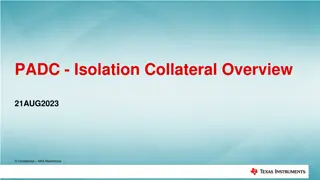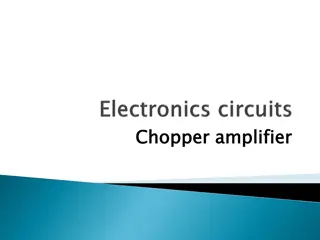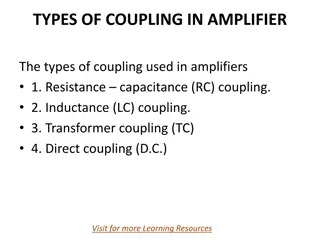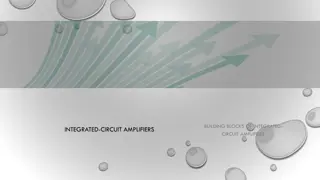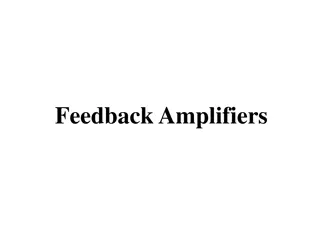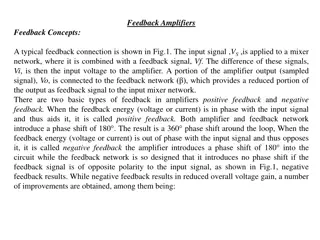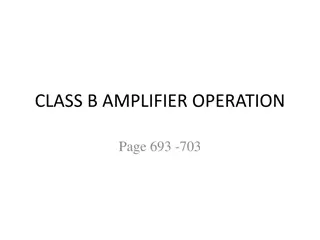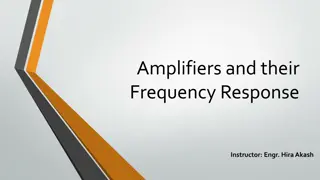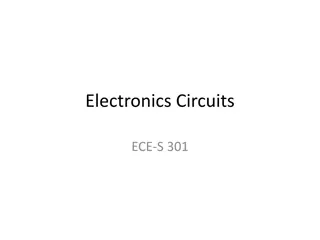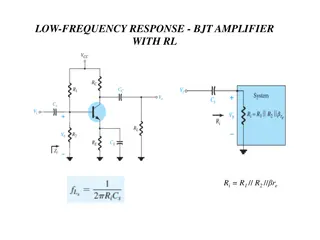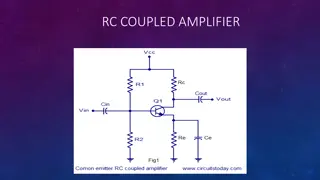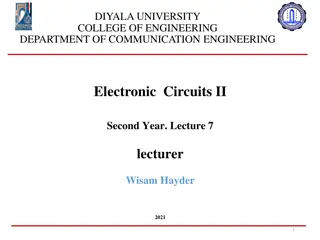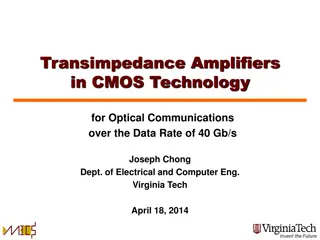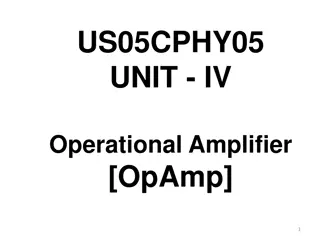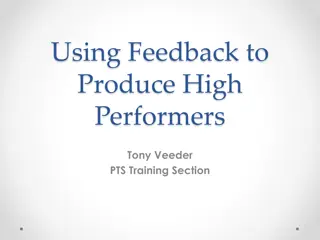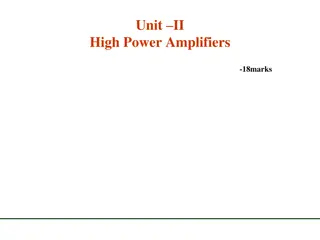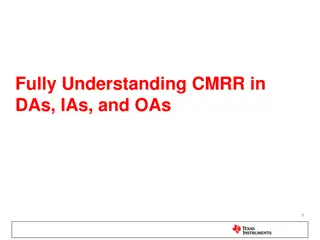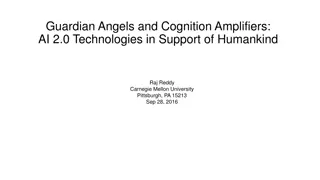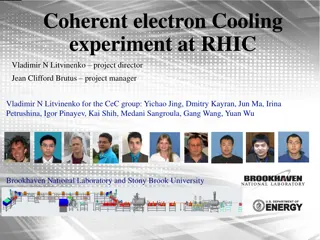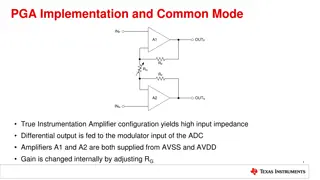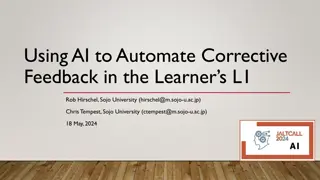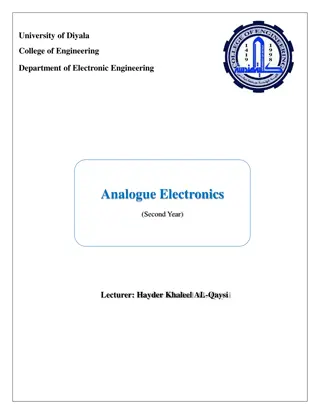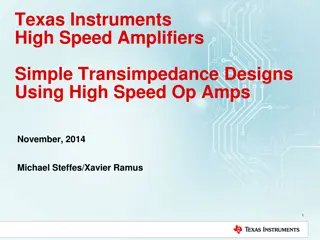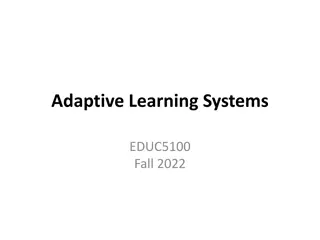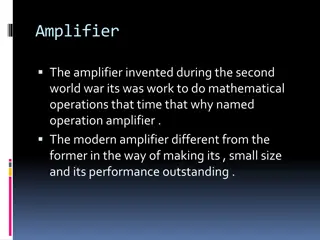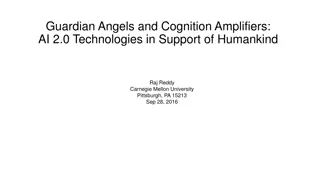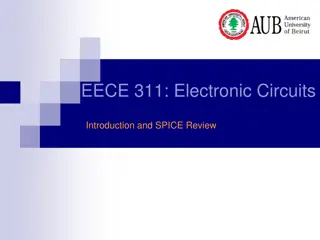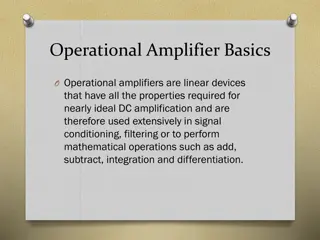Enhancing Student Learning Through Effective Feedback Strategies
Effective feedback plays a crucial role in improving student learning outcomes by providing specific information that students can use to enhance their performance. This content explores the importance of feedback, examples of good feedback practices, qualities of good feedback, and what components
5 views • 16 slides
Isolated Amplifiers and Modulators: Comprehensive Overview
This content provides a detailed overview of isolated amplifiers and modulators, highlighting their design considerations, comparing their features, discussing EMI performance best practices, and offering Excel calculators for voltage and current sensing accuracy. It covers important aspects such as
0 views • 16 slides
Understanding Chopper Amplifiers: Applications and Benefits
A chopper amplifier is an electronic circuit methodology used to minimize signals, DC offsets, noise, and low-frequency circuit conditions in operational amplifiers. Chopper stabilized amplifiers employ modulation to reduce noise, while chopper amplifiers find applications in battery chargers, elect
0 views • 7 slides
Amplifier Coupling Techniques and Applications
Amplifiers utilize various coupling techniques such as resistance-capacitance (RC), inductance (LC), transformer, and direct coupling to connect different stages. Each coupling method has its advantages and applications, such as impedance matching, power transfer, and amplification of radio frequenc
2 views • 16 slides
Effective Feedback Strategies for Learning Enhancement
Feedback plays a crucial role in the learning process. This session focuses on strategies for providing effective feedback to improve learning outcomes, course, and assignment design, best practices, and tools for efficient feedback delivery. Understanding the importance of prompt feedback and diffe
3 views • 20 slides
Understanding Integrated Circuit Amplifiers and Design Philosophy
Integrated Circuit (IC) amplifiers are essential components in modern electronics, consisting of miniaturized active and passive devices on a semiconductor substrate. This article explores the building blocks, design philosophy, terminology, device variety, and biasing of ICs, emphasizing the use of
0 views • 11 slides
Understanding Feedback Amplifiers: Structure, Properties, and Topologies
Electronic circuits rely heavily on feedback mechanisms, particularly negative feedback, for various purposes such as desensitizing gain, reducing distortion, controlling impedance, and improving amplifier bandwidth. This article explores the general structure of feedback, properties of negative fee
0 views • 68 slides
Enhancing Feedback Practices with Audio-Visual Technology: A Study on Student Satisfaction and Attainment
This presentation delves into the implementation of Audio-Visual Feedback (AVF) technology to improve assessment feedback practices in an educational institution. The study explores the impact of AVF on student satisfaction levels compared to traditional written feedback, as well as its influence on
0 views • 21 slides
Understanding the Importance of Feedback in Achievement Enhancement
Feedback plays a crucial role in encouraging or discouraging behavior, making it essential to provide constructive feedback that focuses on growth and improvement. Improper feedback can lead to incompetence in the workplace. Learn about the definition of feedback, how to give feedback effectively, a
2 views • 22 slides
Understanding Feedback Amplifiers in Electronic Circuits
Feedback amplifiers play a crucial role in electronic circuits by providing mechanisms for controlling gain, stability, and overall performance. There are two basic types of feedback - positive and negative, each offering distinct advantages. The four ways of connecting feedback signals involve volt
1 views • 18 slides
Efficient Class B Amplifier Operation and Power Calculation
Class B amplifiers offer greater efficiency compared to single transistor Class A operation. This article covers the push-pull operation of Class B transistors, input DC power calculations, connecting push-pull amplifiers to loads, output AC power measurement, efficiency calculation, and power dissi
0 views • 28 slides
Understanding Cascade Amplifiers and Their Applications
Cascade amplifiers are two-port networks designed with amplifiers connected in series, providing enhanced signal strength in various applications such as TV receivers and tuned RF amplifiers. These amplifiers use multiple stages to amplify the overall voltage gain, overcoming limitations of single-s
0 views • 15 slides
Understanding Multistage Amplifiers in Electronics Circuits
Explore the concept of multistage amplifiers in electronics circuits, where several amplifiers are arranged in a cascaded manner to increase gain and reduce distortion. Learn about the benefits, applications, and differences between cascade and cascode amplifiers in this informative guide.
0 views • 22 slides
Analysis of Low-Frequency Response in BJT and FET Amplifiers
This analysis delves into the low-frequency response of BJT and FET amplifiers, examining the impact of various components such as resistors and capacitors on the cutoff frequencies. Detailed examples illustrate the calculation process for determining these frequencies based on specific parameters.
0 views • 18 slides
Understanding RC Coupled Amplifiers and Transistor Basics
Amplification is the process of increasing signal strength without changing its characteristics. An RC coupled amplifier is a multistage amplifier using resistors and capacitors. Transistor amplifiers amplify signals based on transistors with different configurations. The common emitter configuratio
0 views • 23 slides
Transistor Tuned Amplifiers: Operation and Analysis
Transistor tuned amplifiers consist of a parallel tuned circuit as the collector load, amplifying a specific frequency while rejecting others. The resonant frequency of the tuned circuit is crucial for amplification. A high Q circuit offers maximum voltage gain at the resonant frequency but decrease
0 views • 30 slides
Enhancing Feedback Strategies in ELA Learning Project Day
Refine understanding of ELA, engage with student exemplars, and design constructive feedback in a structured agenda. Activities include generating feedback, digging deeper into feedback processes, and considering the impact of timely and specific feedback on student growth in learning and skills. Co
0 views • 31 slides
Transimpedance Amplifiers in CMOS Technology for Optical Communications at 40 Gb/s
This research by Joseph Chong at Virginia Tech delves into the use of transimpedance amplifiers (TIAs) in CMOS technology for optical communications operating at a data rate of 40 Gb/s. The study outlines the motivation behind the project, the role of TIAs in optical receivers, TIA circuit topologie
0 views • 52 slides
Understanding Operational Amplifiers (Op-Amps) and Their Applications
Operational Amplifiers (Op-Amps) are devices used to amplify signals using an external power source. They are composed of transistors, resistors, and capacitors. Op-Amps find applications in summing amplifiers, AC and DC signal processing, digital-to-analog converters, active filters, oscillators, r
1 views • 41 slides
Effective Feedback Strategies for Resident Teachers
Effective feedback is critical for the growth of resident teachers. This guide covers types of feedback, why it's important, what makes feedback effective, behaviorally anchored rating scales, models for giving feedback, and key tips for delivering feedback successfully.
0 views • 14 slides
Effective Feedback Strategies for High Performance
Feedback plays a crucial role in helping individuals improve performance and reach their full potential. From providing helpful feedback to reinforcing desired behaviors, this guide explores various strategies, including redirection, reinforcement, and F.A.S.T. feedback, to enhance workplace perform
0 views • 21 slides
Understanding High Power Amplifiers with BJT for Efficient Performance
Explore the world of high-power amplifiers utilizing BJT technology, focusing on factors like linearity, efficiency, and maximum power capability. Learn about different amplifier classes - A, B, AB, and C - each with unique operating characteristics. Discover the significance of amplifier efficiency
0 views • 22 slides
Enhancing Postgraduate Academic Writing: Feedback Collaboration Model
Developing a collaborative model for postgraduate academic writing courses involves understanding the role of feedback, focusing on content feedback, and exploring the intersections between discipline specialist and writing tutor feedback to improve academic writing abilities. Feedback offers valuab
1 views • 27 slides
Understanding CMRR in Differential Amplifiers
Differential input amplifiers, including operational, instrumentation, and difference amplifiers, play a crucial role in amplifying differential signals while rejecting common-mode noise. The Common-Mode Rejection Ratio (CMRR) is a key parameter in these amplifiers, indicating their ability to suppr
0 views • 48 slides
Guardian Angels and Cognition Amplifiers: Enhancing Human Intelligence with AI 2.0 Technologies
Harnessing the power of AI 2.0 technologies, Guardian Angels and Cognition Amplifiers (Gats and Cogs) augment human intelligence by continuously monitoring user activity patterns and intentions through smartphone sensors. These tools enable automation of daily activities, personalized assistance, an
0 views • 27 slides
Understanding Amplifiers in Electrical and Electronic Principles
In the study of Electrical, Electronic, and Digital Principles, amplifiers play a crucial role in signal processing and transmission. This lecture delves into the classification of amplifiers based on frequency capabilities, coupling methods, and usage scenarios. By exploring different classes of am
0 views • 20 slides
Iterative Feedback Framework for Prototype Improvement
The iterative feedback framework involves making sense of user feedback using the Keep, Chuck, Change, Create (KCCC) model to iterate and enhance prototype solutions. This process helps organize input from testing sessions, informing necessary modifications for better outcomes. The framework emphasi
1 views • 26 slides
Coherent Electron Cooling Experiment at RHIC - Project Overview and Experimental Possibilities
Coherent electron cooling experiment at RHIC is led by Vladimir N. Litvinenko with Jean Clifford Brutus as the project manager. The CeC group, consisting of researchers from Brookhaven National Laboratory and Stony Brook University, aims to test various experimental scenarios, including high gain FE
0 views • 18 slides
Understanding PGA Implementation and Common Mode Voltage in Instrumentation Amplifiers
The PGA implementation in instrumentation amplifiers allows for high input impedance and precise gain adjustment through internal settings. Common mode voltage plays a crucial role in ensuring proper amplifier operation, with limitations and potential violations impacting signal integrity. Examples
0 views • 5 slides
AI Automation for Corrective Feedback in Language Learning
Exploring the utilization of AI technology to automate and enhance corrective feedback in language learning, addressing challenges such as time constraints, delayed feedback, and student comprehension. Introduction of a new AI text tool by Marcus Green for accessible and effective feedback provision
0 views • 13 slides
IEEE 802.11-19/0709r0 - Immediate and Delayed Feedback May 2019
The document discusses immediate and delayed feedback mechanisms in IEEE 802.11-19/0709r0, focusing on parameters, feedback types, and ranging options. It explores variations in feedback direction and types, proposing options for phase shift feedback and distinguishing between RSTA-to-ISTA and ISTA-
0 views • 6 slides
Analogue Electronics Course Overview at University of Diyala - Hayder Khaleel AL-Qaysi
Explore the comprehensive syllabus of the Analogue Electronics course offered in the Department of Electronic Engineering at University of Diyala. Lectured by Hayder Khaleel AL-Qaysi, topics covered include Introduction to Electronics, Diodes, Bipolar Junction Transistors (BJTs), Power Amplifiers, a
0 views • 8 slides
High-Speed Amplifiers: Design Techniques and Considerations
This detailed document explores the design aspects of high-speed amplifiers, focusing on transimpedance designs using high-speed op-amps. It covers basic and advanced design issues, frequency response analysis, and key considerations for achieving desired performance. The content emphasizes simplifi
0 views • 44 slides
Understanding Feedback in Learning Systems
Exploring the role of feedback in educational settings, this content delves into the concept of providing information to learners by various agents. It discusses the importance of feedback in guiding learning progress, highlighting examples of correctness feedback and correct answer feedback. The be
0 views • 66 slides
Evolution of Amplifiers: From WWII to Modern Integrated Circuits
Amplifiers have come a long way since their invention during WWII for mathematical operations. The modern amplifier is compact, high-performing, and integrated with transistors, resistors, and capacitors on a single chip. The properties of operation amplifiers, input modes, and differential inputs a
0 views • 10 slides
Guardian Angels and Cognition Amplifiers: Transforming Human Intelligence with AI 2.0 Technologies
This explores the integration of AI technologies to enhance human cognition through the creation of personalized Guardian Angels (Gats) and Cognition Amplifiers (Cogs). These tools leverage multimodal sensors on smartphones to monitor activities, infer intentions, and automate daily tasks. The syste
0 views • 27 slides
Electronic Circuits Introduction and SPICE Review Course Information
This course, EECE 311, provides an in-depth exploration of electronic circuits, covering topics such as BJT and MOSFET amplifiers, feedback systems, operational amplifiers, oscillators, and digital CMOS circuits. Students will gain knowledge on amplifier characteristics, frequency response, and the
0 views • 8 slides
Understanding Operational Amplifiers: Basics and Feedback Mechanisms
Operational amplifiers are versatile linear devices used for amplification, signal processing, and mathematical operations. They consist of high-impedance inputs and an output port, enabling various functions such as addition, subtraction, and differentiation. Incorporating feedback mechanisms like
0 views • 6 slides
Feedback and Mentoring Workshop for HIV Researchers
Mentoring workshop for HIV researchers focusing on giving and receiving feedback, nurturing early career investigators, and working with faculty continuum. The workshop offers insights on feedback exercises, assumptions, and rhetorical questions about feedback. Participants are encouraged to reflect
0 views • 33 slides
RF Power Amplifiers in International Partnership - Development and Contribution Overview
The collaboration between various international partners such as India/DAE, Italy/INFN, UK/STFC, France/CEA/Irfu, CNRS/IN2P3, under the leadership of James Steimel, involves the in-kind contribution of RF power amplifiers for accelerator applications. Partners like DAE/BARC and DAE/RRCAT exhibit sig
0 views • 19 slides

